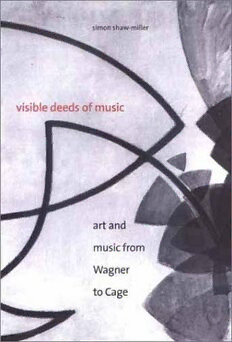
Visible Deeds of Music: Art and Music from Wagner to Cage PDF
305 Pages·2002·1.267 MB·English
Most books are stored in the elastic cloud where traffic is expensive. For this reason, we have a limit on daily download.
Preview Visible Deeds of Music: Art and Music from Wagner to Cage
Description:
A study of the relationship between music and the visual arts in the late-19th and 20th centuries, focusing on the modernist period. Reassessing the work of composers and artists such as Richard Wagner, Pablo Picasso, Paul Klee, Josef Matthias Hauer and John Cage, Simon Shaw-Miller argues that despite modernism's advocacy of media purity and separation, the boundaries between art and music were permeable at this time, as they have been throughout history. Shaw-Miller begins by discussing the place of Wagner's music and ideas at the time of the birth of modernism, presenting Wagner's aesthetic of the "Gesamtkunstwerk" as an alternative paradigm for modernist art. He goes on to analyze Picasso's use of musical subjects in his cubist works and Klee's adoption of music and the issue of temporality in his paintings and drawings. He concludes with the radical aesthetic of Cage, the silencing of sound, and the promotion of intermediality in the work of Fluxus artists. Through these examples, Shaw-Miller raises questions about both art and music history that should be of interest to students of both disciplines.
See more
The list of books you might like
Most books are stored in the elastic cloud where traffic is expensive. For this reason, we have a limit on daily download.
